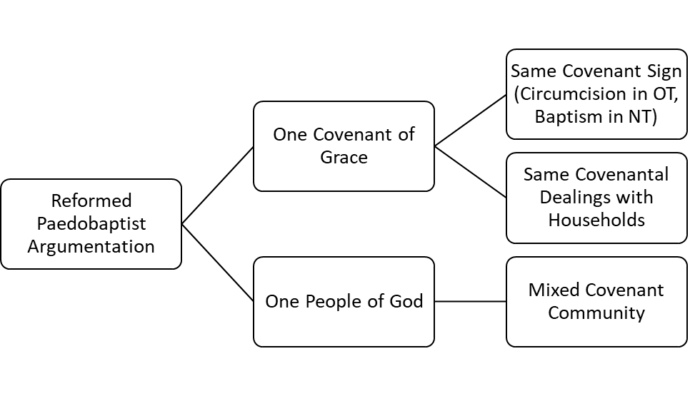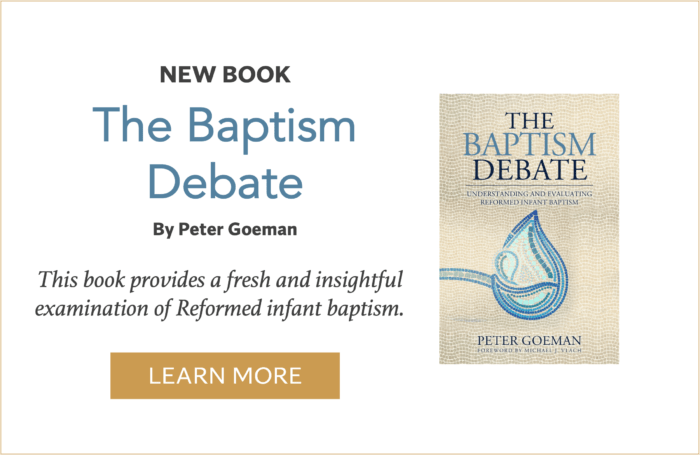Covenant Theology and Infant Baptism

Reformed paedobaptists are not shy to assert that their defense of infant baptism relies on covenant theology. In fact, although many Baptists take issue with infant baptism not being mentioned anywhere in Scripture, this is really a simplistic understanding of the Reformed position. In reality, for the Reformed paedobaptist, the entirety of the debate centers around the unified covenant of grace. Note the words of paedobaptist Cornelis Venema:
This debate can be reduced to one principal question: Does the covenant of grace in its New Testament administration embrace the children of believing parents just as it did in the Old Testament administration? However complex and diverse the arguments, pro and con, on the subject of infant baptism may be, this remains the overriding issue. Precisely because the debate between paedobaptists and Baptists centers on the doctrine of the covenant of grace, particularly the similarity and dissimilarity of the covenant in its Old and New Testament administrations, it can hardly be resolved merely by appealing to specific biblical texts.[1]
Similarly, in Robert Booth’s book, Children of the Promise, he outlines the foundations for a defense of infant baptism as follows:[2]
- Covenant Theology. Throughout the Bible, God relates to his people by way of a covenant of grace. Covenant theology provides the basic framework for rightly interpreting Scripture.
- Continuity of the Covenant of Grace. The Bible teaches one and the same way of salvation in both the Old and the New Testaments, despite some different outward requirements.
- Continuity of the People of God. Since there is one covenant of grace between God and man, there is one continuous people of God (the church) in the Old and New Testaments.
- Continuity of the Covenant Signs. Baptism is the sign of the covenant in the New Testament, just as circumcision was the sign of the covenant in the Old Testament.
- Continuity of Households. Whole households are included in God’s redemptive covenant.
Infant Baptism and the Continuity between Old and New Testaments
The reason the covenant of grace is so essential to the Reformed argument, is because it provides a lens through which continuity can be established between the Old and New Testaments. If the sign of the covenant in the Old Testament was circumcision, then it is reasonable that baptism would be the manifestation of the covenant sign in the New Testament—it is the same covenant, and the need for similar application of the covenant sign remains. In this view, baptism has replaced circumcision as the sign of the covenant of grace.
As such, what can be said about circumcision, namely, that it does not apply only to believers, also applies to baptism. One of the best explanations of this connection is that of B.B. Warfield who notes,
The argument in a nutshell is simply this: God established His Church in the days of Abraham and put children into it. They must remain there until He puts them out. He has nowhere put them out. They are still then members of His Church and as such entitled to its ordinances. Among these ordinances is baptism, which standing in similar place in the New Dispensation to circumcision in the Old, is like it to be given to children.[3]
For the covenant theologian, because the covenant is the same, and the God of the covenant is the same, we would expect God to deal with households and their children rather than only individuals. In other words, God has obligated himself through covenant to work not only with individuals, but also their households. Therefore, it would be strange if infants would be ignored in the New Testament, while they are an integral part of the covenant community in the Old Testament. It is this key theological principle which leads some Reformed paedobaptists, like Doug Wilson, to say, “The debate about infant baptism is fundamentally a debate about children, and not really a debate about baptism at all.”[4]
Finally, as the above Warfield quote illustrates, a key assumption by Reformed paedobaptists is the unity of the people of God between the Old and New Testament. In other words, the Reformed argument for paedobaptism assumes no distinction between Israel in the Old Testament, and the Church in the New Testament.
This unity of the people of God is often viewed so strongly that covenant theologians will regularly refer to the “Church of the Old Testament” when referring to Israel. Thus, because the people of God are the same in covenant theology, there is an expectation that the New covenant community is mixed (i.e., made up of believers and unbelievers), just like the Old Testament covenant community. In other words, for the reformed paedobaptist there is a difference between the elect (those that are saved), and those that are a part of the Church in covenant with God.
To summarize, the Reformed argument for paedobaptism rests on two foundational realities: (1) the unity of the covenant of grace between the Old and New Testament, and (2) the unity of the people of God. This naturally leads to the idea that the sign of the covenant of grace would be the same (or at least similar), and that God acts with His people in the same way, since He is covenanted to them by the same covenant.

I personally think there are some problems with this line of reasoning, but that will have to wait for further blog posts.
[1] Venema, “Covenant Theology and Baptism,” 202. Emphasis added.
[2] Robert R. Booth, Children of the Promise: The Biblical Case for Infant Baptism (Phillipsburg, NJ: P & R Publishing, 1995), 8.
[3] B. B. Warfield, “The Polemics of Infant Baptism,” in Studies in Theology (1932; reprint, Grand Rapids: Baker, 1981), 9:408. cf. Cornelis P. Venema, “Covenant Theology and Baptism,” in The Case for Covenantal Infant Baptism, ed. Gregg Strawbridge (Phillipsburg, NJ: P & R Publishing, 2003), 201.
[4] Douglas Wilson, “Baptism and Children: Their Place in the Old and New Testaments,” in The Case for Covenantal Infant Baptism, ed. Gregg Strawbridge (Phillipsburg, NJ: P & R Publishing, 2003), 287.
Photo by Josh Applegate on Unsplash

2 Comments
Dwight Osborne
Infant baptism is NOT Biblical. Covenant theology is not Biblical as well. Water baptism does NOT save and is not necessary for salvation; the baptism that saves is the baptism of the Holy Spirit, Titus 3:5, which happens at the moment one places their faith in Christ, Galatians 3:2. While the Bible doesn’t teach covenant theology, it DOES teach dispensational theology and since Yehovah is the Head dispensationalist, premillennialist and Zionist, they’re all positions we should adopt and embrace,
Alexander Krause
In this post, you have defined the problem against which Dispensationalism was formulated as a counterpoint. Perhaps, instead of devising an equally faulty system, a better way forward can be found.
Of course this error cannot be refuted only piecemeal and a coherent whole view of the bible needs presenting, but, I believe an equally bad system (or, worst system) has only hardened those believers of Covenant Theology.
Therefore, piecemeal refutation is the place to start instead of jumping the gun and trotting out a bad replacement. Let them adjust their view by chipping away at their foundation. There is plenty of unsatisfactory points in their system. In my view, D.T. is even more man-centric than C.T. Dispensationalism was not yet ready for primetime.